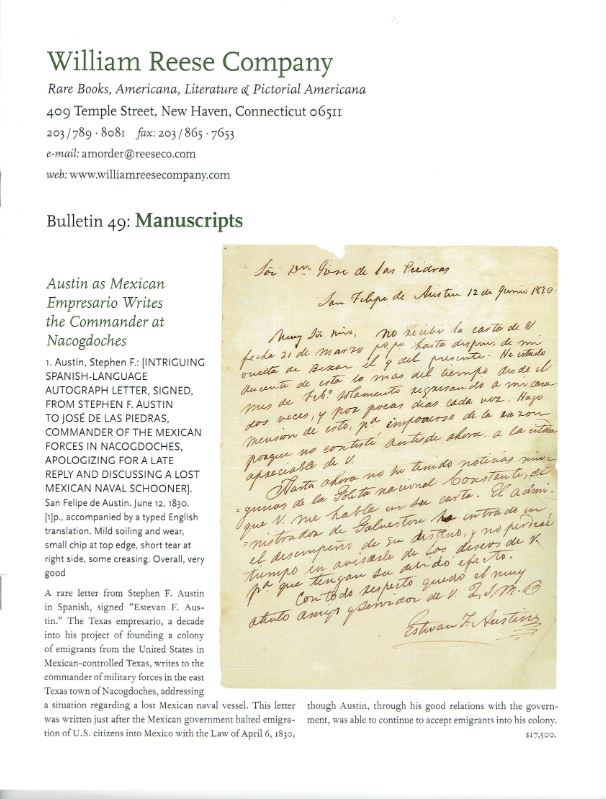Manuscripts from the William Reese Company
- by Michael Stillman

Manuscripts from the William Reese Company
The William Reese Company has issued a selection of Manuscripts. These are manuscripts that either come from America or pertain to America. This includes not just the United States, but Canada, Central America, and the Caribbean. These documents have been written by people ranging from George Washington to a lowly soldier in the Civil War. Each is interesting and important in its own way. Here are a few of them.
We begin with the beginning of the Civil War. After the first southern states seceded, South Carolina applied pressure on the Union to evacuate Fort Sumter in Charleston Harbor. United States forces refused. They were at a major disadvantage with men and supplies dwindling and resupply difficult in hostile territory. After a notice of intention to resupply the fort, followed by an ultimatum to vacate from the Governor of South Carolina, Confederate forces began bombardment in the early morning of April 12, 1861. Union forces held on as long as they could, but by the following day, April 13, they were forced to surrender the fort. They left with no loss of life on either side. Item 4 is a letter written by Edward S. Aldrich, a surgeon, to his sister-in-law on April 13. Aldrich had previously been a U.S. Army surgeon, but at this point, he was on his way to Charleston to volunteer to serve Confederate troops. He was riding on a passenger ship when the bombardments began. His ship was held up in the harbor by the fighting, from which he witnessed the event. As soon as it concluded, he whipped off this letter describing what he saw. Priced at $12,500.
We will end this war quickly. Fast forward to April 3, 1865, Lee's surrender at Appomattox just six days away. Grant had laid siege on Richmond, capital of the Confederacy, in the waning days of the war. Finally, President Jefferson Davis recognized the inevitability of its fall. He took the last train, or more precisely, followed the last open railroad tracks out of the city. As the Confederate forces abandoned the city, General Grant wrote down this order in pencil in the early morning hours of April 3 to be telegraphed to General Weitzel. In it, Gen. Grant instructs him seize control of the city. He also tells Weitzel that once he does, not to let anyone leave Richmond as he planned to cut off the Confederate retreat. By 8:15 that morning, Weitzel was able to respond with a "mission accomplished" message. Item 18. $140,000.
Item 48 is a letter from George Washington, filled with sorrow for a friend, one he would too soon have to endure himself. It was written on April 20, 1773, two years before Washington took charge of the Continental Army. It was written to a close friend, Burwell Bassett, who was married to Martha Washington's sister. In it, Washington offers his condolences. Bassett's daughter had just died. Washington also notes that his stepson, John Parke Custis, had become engaged. Only two months later, Washington would write Bassett again, this time having to inform the latter that his own stepdaughter, Martha "Patsy" Custis, had died at age 17. $37,500.
He is not as beloved as Washington, but Martin Van Buren was President too. Item 44 is a 14-page manuscript draft section of Van Buren's autobiography. It pertains to his impressions of John Quincy Adams, also a President. Van Buren and Adams were political opponents. Van Buren was an ardent supporter of Andrew Jackson, serving as Jackson's vice-president before being elected to the presidency himself. Jackson believed Adams had stolen the presidency from him in the election of 1824 through his alleged "corrupt bargain" with Henry Clay. Jackson was bitter. However, despite being strong political opponents, Van Buren attempts to be fair and writes respectfully of Adams. Ultimately, Van Buren considered his adversary to be an honest, incorruptible, patriotic man. It may have helped that this was probably written around 1854, several years after Adams died and Van Buren was long out of office. Additionally, while not so much in their presidential years, both became strong opponents of slavery in their post-presidential days, Adams as a congressman and Van Buren as a minor party presidential candidate in 1848. $9,000.
This may look like an odd item for Americana. It is a 28-page document in Japanese on rice paper. It was written by Japanese scribes. It is the content that connects it to America. What it consists of is five letters translated from English to Japanese. The document comes from 1853, with two of the letters coming from (outgoing) President Millard Fillmore, three from Commodore Perry. They pertain to America's demand that Japan open itself to trade. The Japanese wanted to remain isolated, but America was prepared to use "gunboat diplomacy" to force that nation to open its doors. The letters were presented to Prince Ido and Prince Toda to be delivered to the Emperor. Scribes produced copies to be given to Japan's upper council, but first, naturally enough, they needed to be translated to Japanese. Item 16. $15,000.
The William Reese Company may be reached at 203-789-8081 or amorder@reeseco.com. Their website is www.williamreesecompany.com.